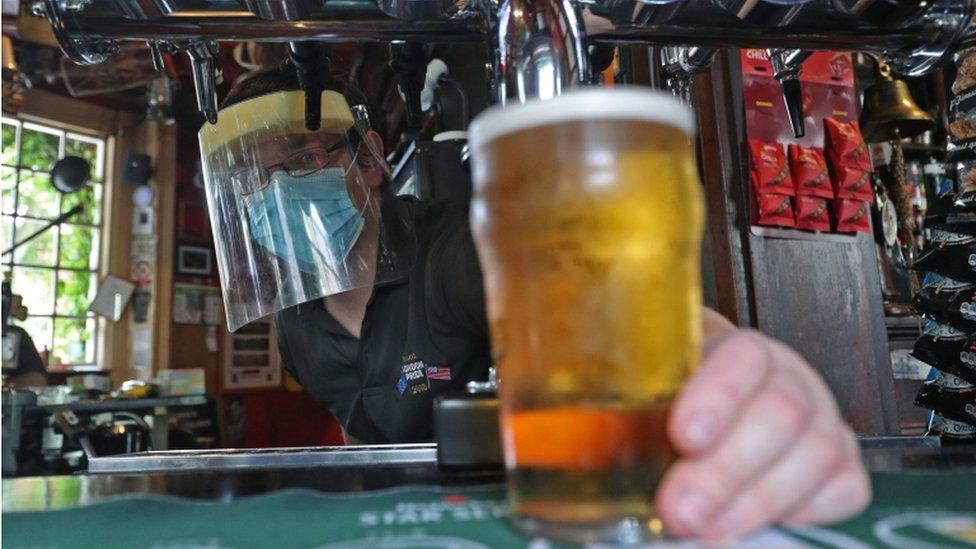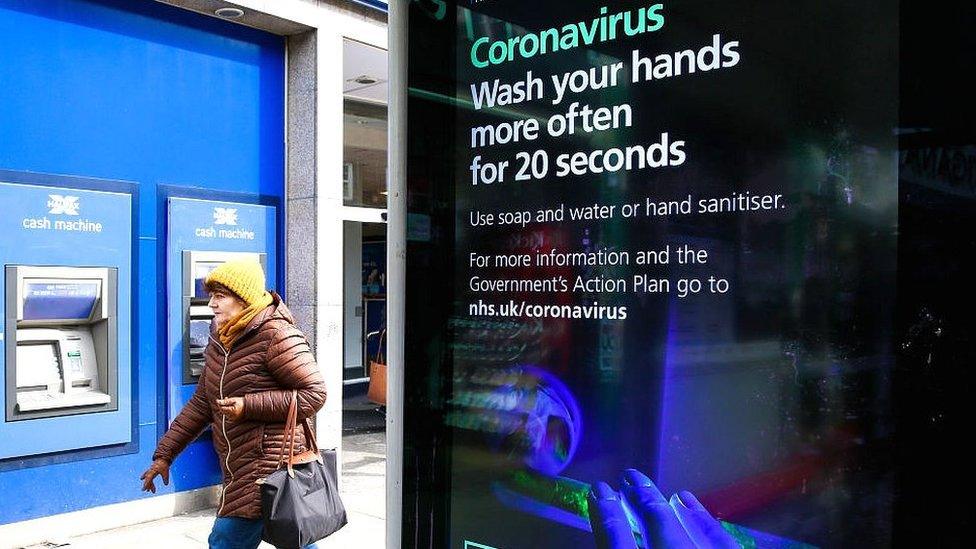Covid: What is the evidence for the new hospitality rules?
- Published

Pubs and restaurants will be banned from serving alcohol from Friday
The Welsh Government has faced pressure this week to produce evidence to support tough new restrictions on the hospitality industry to help reduce the spread of coronavirus.
On Wednesday evening it published a report by its scientific advisory group, TAC, referring to a recent paper issued by UK ministers, external that pulls together some of the information that helps scientists understand where transmission is occurring.
This is evidence First Minister Mark Drakeford and his colleagues looked at when deciding on laws which will ban alcohol in pubs and restaurants from Friday, and close all hospitality venues in Wales at 18:00 every night.
Plaid Cymru maintains that the Welsh Government has failed to answer questions about the decision, while the Tories claimed Welsh customers will go across the border.

The UK government paper considers Covid strategies in the UK and around the world
Businesses can offer a takeaway service after 18:00, and if they have an off-licence can sell takeaway alcohol up until 22:00.
The UK government document says that each type of data has limitations, but it is "consistent in supporting the view that hospitality venues are a significant risk for transmission".
Analysis of UK coronavirus measures
Sage (the Scientific Advisory Group for Emergencies) has analysed the impact of introducing tiers and national level restrictions.
That suggests that "it is only possible to get R consistently below 1 in places where there have been substantial restrictions on hospitality" .
R is the number of people that one infected person will pass on a virus to, on average.
That means places in the UK that have introduced English tier three type restrictions or higher have seen the pandemic shrink.
Other interventions have produced "a more mixed picture", according to SAGE.
Research from other parts of the world
International studies looking for connections between events or locations and infection have "found significant association between hospitality and infection", the paper says.
A report from the US Centre for Disease Control found that people infected with Covid-19 without having knowingly been in close contact with an infected person were nearly three times more likely to say they had been to a restaurant and nearly four times more likely to say they had been to a bar or a coffee shop.

The R number is a key factor in deciding when restrictions are eased
Analysis of outbreaks in Japan, China, South Korea and Indonesia "noted that their largest "superspreading" events, where the number of cases transmitted us disproportionately high originated from pubs, clubs, restaurants, gyms and wedding venues."
However, clusters in Japan have also been traced to hospitals and other care facilities.
Sage's own advice
The UK government paper also refers to Sage advice that close face-to-face contact for prolonged periods, in crowded indoor settings, is high risk.
Sage says that risk is higher in loud, poorly ventilated environments.
"These are all prevalent in the hospitality sector (but not unique to it)," the paper says.
Sage also says the effect of alcohol can make people disregard Covid-safe behaviour such as social distancing.
What do opposition parties say?
Plaid Cymru leader Adam Price said Welsh ministers "cannot point to any modelling undertaken relating to the important details of its new restrictions", saying they had "eroded public confidence and alienated the hospitality sector".
He said: "Why is there a total ban on alcohol? Did they undertake modelling on allowing a limited number of alcoholic drinks per customer?
"Where are the modelling comparisons between banning alcohol and closing at 6pm compared with allowing hospitality to stay open until 8pm with alcohol served until 7pm? "A failure to answer these questions weakens the Welsh Government's case and will further frustrate a sector in which some businesses will never recover."
Darren Millar, who speaks for the Welsh Conservatives on Covid recovery matters, said that while he welcomed the lifting of travel restrictions between Wales and parts of the UK, announced on Thursday, "this news will rub salt in the wounds of the Welsh hospitality industry".
"With Welsh pubs, cafes and restaurants being banned from selling alcohol on their premises from 6pm tomorrow, many of their customers will be taking their custom and cash across the border to enjoy a tipple with a meal in England instead," he said.
"The Welsh Labour-led government must rethink its new rules, engage with leaders the hospitality industry and adopt a more targeted approach to intervention that keeps the Welsh pound in Wales, and attracts the English pound into Welsh businesses too, especially in the run up to Christmas."